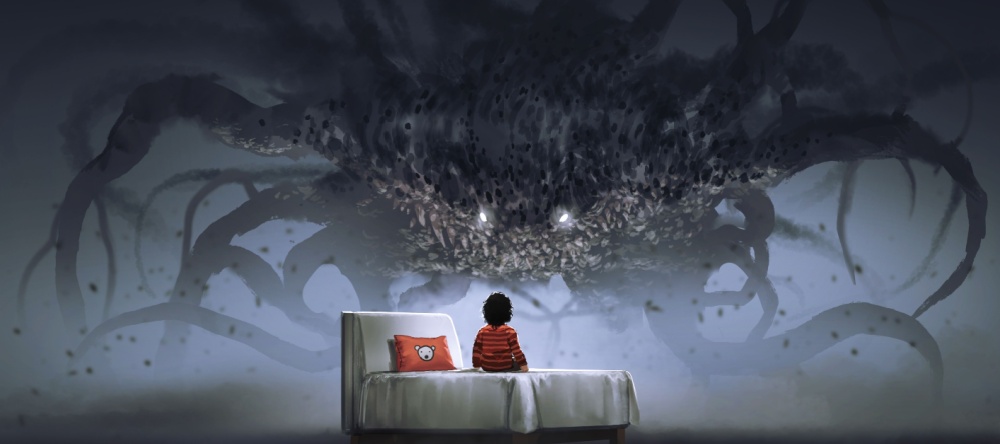Do you or your child experience nightmares or restless sleep? Did you know they could be linked to a bigger problem called sleep apnea?
Picture this, your head hits the pillow, your eyes grow heavy, but then nightmares invade. Twisted visions disturb your sleep, jolting you awake with a pounding heart and sweaty hands.
Does this sound familiar?
For many, frightening nightmares and restless insomnia dominate their nights. But these nightly disturbances might hint at a deeper problem. Addressing this issue could restore peaceful sleep.
Concerned That Your Child’s Nightmares Could Be an Airway Issue? Take Our Free Quiz.
Your Airway is the Key to Avoid Nightmares
An overactive mind can certainly cause bad dreams occasionally. Stress or emotions from the day may also disrupt sleep also. But when troubling nightmares become routine, physical problems often cause the unrest. Our airways play a key role here.
Breathing issues during sleep prevent proper airflow, reducing oxygen to the brain. This triggers mini-awakenings throughout the night. These rousing’s disrupt deep REM sleep, preventing proper emotional processing and restoration.
Without enough REM sleep, our minds can’t cope properly, leading to more frequent and vivid nightmares. Poor breathing during sleep also causes chronic fatigue, fueling anxiety and emotional imbalances.
In children, troubled nights create an unhealthy cycle:
- Restless sleep → Daytime drowsiness, difficulty focusing
- Nightmares → Heightened anxiety, poor coping abilities
- Chronic fatigue → Acting out, behavior issues, learning problems
If you or your child suffer from frequent nightmares or insomnia, an obstructed airway might be the culprit. Treatment may be necessary, be sure to ask Dr. Yamashiro if you’re at risk.
Mouth Breathing: Obstructing the Airways
A lot of sleep-related breathing issues are caused by mouth breathing. Although it may seem harmless, this habit can significantly impact our airways. Mouth breathing over time can alter nasal development, narrowing the nasal cavity and reducing airflow. Additionally, allergies, colds, or enlarged adenoids and tonsils can further obstruct nasal breathing.
When nasal breathing is restricted, we instinctively open our mouths to compensate. This bypasses the nasal filter, drying and irritating the airway, and robbing our air supply of moisture and filtering. Over time, “mouth breathing face” develops—narrowed jaw, high arched “V-shaped” palate, crooked teeth—further crowding our nasal passages.
As breathing struggles worsen, especially during sleep, oxygen deprivation follows. Mini-awakenings become routine, disrupting sleep cycles. Nightmares and insomnia often follow.

Who’s At Risk for Airway Issues?
Mouth breathing can start early in childhood due to:
- Enlarged tonsils/adenoids
- Chronic nasal allergies or congestion
- Frequent colds that make nasal breathing difficult
- Nasal/sinus trauma
Later in adulthood, mouth breathing indicates sleep apnea, especially if paired with:
- Loud snoring—turbulent air struggling to pass obstructed airways
- Grogginess despite sleep—poor oxygenation during sleep
- Teeth grinding—physical effort to open obstructed airway
- Focus/attention problems—effects of poor sleep
Without treatment, mouth breathing and its effects persist into adulthood. Nightmares, insomnia, and other problems continue or worsen. Correcting the breathing obstruction is key to resolving these issues.
Open Airflow = Sound Sleep
To restore restful nights, we must open and protect our airways:
- Open nasal passages: Check for enlarged adenoids/tonsils. Treat chronic congestion or allergies. Nasal breathing is crucial.
- Develop proper jaw/palate structure: Palatal expansion creates needed nasal space.
- Keep lips sealed: Break mouth breathing habits. Consciously keep teeth together and lips closed during the day.
With open nasal airways, oxygen flows freely to the brain all night. Mini-awakenings and sleep disruptions become rare. Sleeping well then allows proper emotional processing and rest. The positive results unfold daily:
- More REM sleep → Restore mind and body
- Less fatigue → Reduced anxiety and better focus
- No sleep disruptions → Wake up refreshed
The Airway-Nightmare Link
Still skeptical that airway issues create nighttime troubles? Consider the data:
- 30% of children have sleep problems like insomnia and night terrors, often due to obstructed breathing—mouth breathing and sleep apnea.
- Compared to just 2-3% of adults with chronic nightmares, many childhood breathing issues continue into adulthood.
- Sleep lab tests show poor deep sleep and frequent mini-awakenings in those with airway problems like sleep apnea, leading to nightmares.
Don’t Dismiss Nightmare Woes
At Ecologic Dentistry, we know you want you or child to wake up feeling refreshed and ready to take on the day. If you or your child suffer from frequent nightmares, tossing and turning, or waking up exhausted, something may be disrupting your sleep. The culprit could be right under your nose—your airway.
Crooked teeth or a poor bite alignment can block airflow and contribute to sleeping problems. We understand this leaves you feeling groggy and irritable during the day. It’s frustrating when sleep, something we all need, becomes such a struggle. At Ecologic Dentistry, we believe no one should have to tolerate restless nights and constant drowsiness.
That’s why treatment with Dr. Carla Yamashiro can be the solution.
Here’s how we do it:
- Talk to your doctor: Discuss a sleep evaluation. Check for signs of mouth breathing, sleep apnea, and other airway issues.
- Evaluate Jaw Development: We look at your jaws to see if they have developed properly.
- Sleep study: For potential apnea, start with our simple sleep quiz to see if you have the signs and symptoms of sleep apnea. Dr. Yamashiro may recommend a sleep study from a certified sleep specialist that assesses breathing and oxygen levels during sleep.
If you or your child suffer from nightmares and sleep disturbances, we can help. Schedule a consultation with Dr. Yamashiro at Ecologic Dentistry today. Discover how we can help resolve obstructed breathing for better sleep.
In the meantime, take our free sleep apnea quiz for both kids and adults. See if symptoms like snoring, sore throats, and excessive daytime sleepiness could indicate an airway issue. Dr. Yamashiro uses the Vivos system as one of her solutions to sleep better, ask the team if it is right for you.
You can stop nightmares, restless sleep. With Dr. Yamashiro’s expert care, you can align your airway, improve breathing, and achieve healthy, rejuvenating sleep. Sweet dreams could be just an appointment away.
Schedule your free consultation today!
Concerned That Your Child’s Nightmares Could Be an Airway Issue? Take Our Free Quiz.
FAQs
Can eating certain foods before bed cause nightmares?
Spicy, fried, or fatty foods can disrupt sleep and spark nightmares in some people. Eating big meals close to bedtime can also interfere with sleep. Sticking to lighter dinners and avoiding caffeine and alcohol may help.
Can recurring nightmares signal a mental disorder?
Recurring traumatic nightmares are a symptom of PTSD. Frequent vivid dreams sometimes occur with schizophrenia. But isolated nightmares are rarely tied to mental disorders. Other causes like sleep apnea usually explain chronic nightmares.
Can nasal strips or nasal sprays help nightmares?
Yes, if congestion and mouth breathing are fueling the nightmares. Opening nasal airways with external nasal dilators or nasal sprays reduces mouth breathing. This may help restore oxygenation during sleep and reduce bad dreams.
Can sleep aids like melatonin cause next-day grogginess?
Yes, sometimes. Melatonin can leave you feeling drowsy the next morning. Start with the lowest dose possible. Take it earlier at night – 4+ hours before your desired bedtime. Adjust as needed to find your optimal dose and timing.
Do children outgrow nightmares as they age?
Not always. Pediatric nightmares and sleep disruptions often persist into adulthood if not treated. Airway issues like mouth breathing continue without intervention. Seeking treatment early in childhood can correct these problems early.


